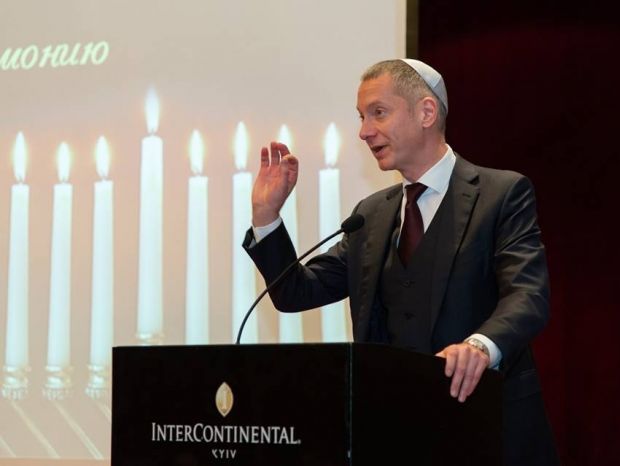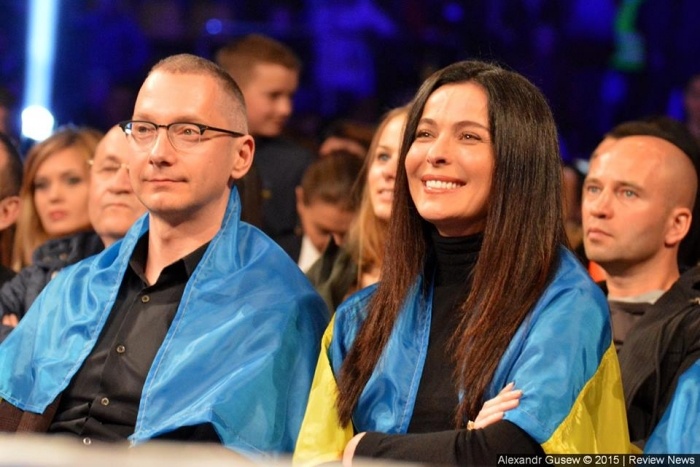I have known Borіs Lozhkin for a long time and I am grateful to him for the fact that far back in 1994 he offered me to become the first editor-in-chief of the weekly “Telenedelya” magazine. I was heading then other popular media outlets, but in a while the creative fate brought me together with Boris again. A long acquaintance with each other allows us to communicate on first name terms, so do not take my manners during the interview as undue familiarity. I really wanted to talk to Boris about his new position – the President of the Jewish Confederation of Ukraine, and I am grateful that our conversation took place really at the shortest terms.
– Boris, it has been more than half a year since you headed the Jewish Confederation of Ukraine, and you are likely to be able to sum up the first results of your work. In this regard, I have several questions to you at once. How difficult or, on the contrary, easy was it for you to make this decision? Have there been any moments during the past six months when you regretted taking this step? What results can you be proud of in your new position, and do your developed connections and experience as a top manager in the field of media and as the Head of the Administration of the President of Ukraine help you?
– It was easy to take this decision. I received the proposal to head the JCU very timely – I have just finished my public work at the National Investment Council and I was thinking what I could do besides business. One gets used to public work quite quickly, so I wanted to keep on, but in a different area.
I started taking part in Jewish public activities still when I lived in Kharkiv. In the mid-90s, together with Boris Elkin, we opened a branch of the Solomon University there, and there were also charity projects. In Kyiv, I have been a member of the board of trustees of the Brodsky synagogue for a long time. The new work at the JCU has not become as something fundamentally new, but the scale has changed.
Our first goal was to maximally unite the number of active, successful Jewish leaders, including from among the younger generation. Today, the JCU’s Supervisory Board includes almost 50 persons. Each of them is ready to participate in real projects for the benefit of the Jewish community; each brings one’s own ideas.
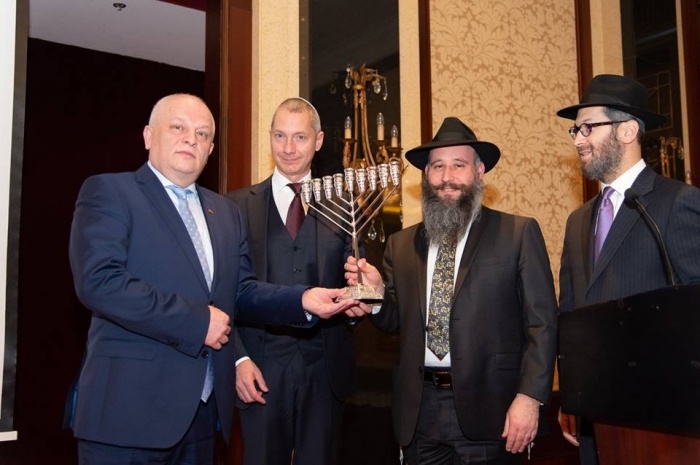 Photo: from the personal archive of Boris Lozhkin
Photo: from the personal archive of Boris Lozhkin
I can probably be proud of our project “The Righteous People of My City”. The objective of this project is to perpetuate the memory of the Ukrainian righteous, the people who saved the Jews during the Second World War. According to the Yad Vashem, there are more than 2,600 such persons in Ukraine. We applied to the city and regional councils all over Ukraine with a proposal, first, to name a street, square or a mini-park with the name of a righteous person – a native of this city, and second, to include a separate lesson in the school curricula once a year during which the children would hear the stories of these people. The project started in September last year. Today, more than a dozen cities and villages have already renamed their streets in honor of the righteous. And we keep on doing this work.
The project “The Righteous of My City” has been highly appreciated at the international level – I talked about it at a meeting of the World Jewish Congress. Perhaps in the near future, other countries will also begin to implement this project.
– You are also the Vice-President of the World Jewish Congress. Does it impose any additional responsibilities on you?
– This is rather a question of coordinating actions and representing the Ukrainian Jewish community in the world arena. I would say that this is not about the duties, but about the additional opportunities.
– Surely not all the readers are in the know about all the subtleties of the Jewish life in Ukraine. Could you explain which organizations are united by the Jewish Confederation of Ukraine, and what are its main functions?
– I think the main subtlety is the same as in the other countries: there are too many people with the only true viewpoint. In Ukraine, there are about 300 Jewish public organizations, and 300 charities to that. I do not even speak about the religious ones. And each of these organizations has its own position on a number of issues. The subtlety is to find such solutions that would unite everyone – at least in the most important, key issues.
This is what the JCU does, in addition to the charitable and public projects. We strive to become the point of unification that would allow us to develop a consolidated position.
– Speaking about the numbers, how large is the Jewish community of Ukraine now, and has the number of those who left for Israel and other countries increased in recent years?
In Ukraine, the Jewish community is the third largest in Europe. According to various estimates, between 50,000 and 400,000 Jews live here.
Of course, there are many that move to Israel. The number of repatriates has tripled in 2014, after the start of the conflict in the East – up to 6,000 people. It has remained approximately at this level since then – 6,000–7,000 Jews leave Ukraine for Israel every year.
However, this trend applies not only to Ukraine, but to the whole of Europe. The record year was 2015, when more than 30,000 persons repatriated to Israel.
The reason, I believe, is a safety concern. In Ukraine, the threat is in the conflict in the east; in Europe – in the growing level of anti-Semitism, which is associated primarily with a large number of Muslim migrants.
– Russia stubbornly promotes the idea that the Nazis are ruling now in Ukraine, and where there is Nazism, there is also anti-Semitism. Is it possible to assert the presence of anti-Semitism in Ukraine?
– I believe that in modern Ukraine, anti-Semitism as a global phenomenon is absent.
At the state level, there is no anti-Semitism for sure – it is difficult to talk about it in a country where the Prime Minister and the Head of the Presidential Administration are Jews, and one third of the parliament is in the inter-factional deputy group of friendship with Israel. The Minister of Internal Affairs Arsen Avakov is very constructive, we are all working together to improve the legislation in order to turn the fight against manifestations of anti-Semitism into a clear criminal plane.
Individual cases of everyday anti-Semitism do happen, but they are not of a systemic nature. This is mainly about anonymous vandalism: anti-Semitic inscriptions appear on the Jewish monuments, and tombstones are destroyed. However, it is difficult to judge how conscious these manifestations are and, in general, whether these are the Ukrainian manifestations.
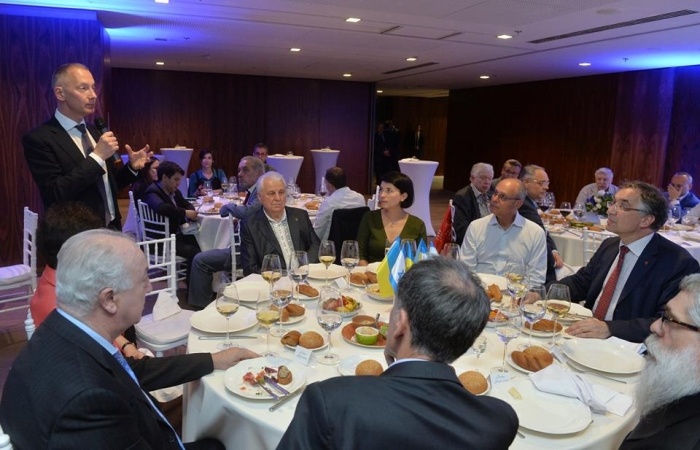 Photo: from the personal archive of Boris Lozhkin
Photo: from the personal archive of Boris Lozhkin
In the conditions of the Russian-Ukrainian conflict, the technology of deliberate discreditation of the Ukrainians is often used. To find the originator of such performances is a task for the investigation. However, we can recall a recent case (not related to the Jews) with an arson attack of the Hungarian-Ukrainian Friendship Center in Transcarpathia. The perpetrators, as the investigation established, were the Poles (they are already being tried in Poland), and the pro-Russian journalist from Germany made an order for it. The ultimate goal of the provocation was to accuse the Ukrainians of intolerance towards the Hungarians. One cannot exclude that the same long chains are lined up also in the cases with the facts of anti-Semitism manifestation.
– Nevertheless, if you look at some posts and comments on the social networks, then there is a lot of aggression towards Jews even in the Ukrainian segment of the same Facebook. It turns out, on the one hand, one feels respect for Israel, the fate of which is somewhat similar to the fate of Ukraine, gratitude to the “zhidobanderivtsi” and IDF veterans, and on the other hand – the traditional complaints, often very aggressive, that the Ukrainians are ruled by the Jews.
– It seems to me that it is worth paying attention, first of all, not to the aggression in the social networks, but to the physical manifestations of anti-Semitism, which are becoming less and less every year. On the Internet, there is always someone who will blame certain groups of the population for all the troubles. After all, just like the Jews, many others are accused in the social networks.
Of course, I'm not talking about ignoring calls to kill. But there will always be complaints.
– How can and must one fight against it? After all, there is a lot of simple false information when the Russians and Ukrainians are labelled as the Jews, if something is disapproved in their actions. Many have seen these fake lists, in which almost half of all the people's deputies are Jews. Why not publish the real figures and data? Should one not feel free to sue those who falsely attribute non-existent surnames to the Ukrainian politicians, to sue those who engage in overt anti-Semitic provocations?
– The whole world is looking for an answer to this question – and not only in the context of anti-Semitism. False information, fake news, post-truth – this is one more challenge that the modern world presents us with. It is possible to fight against this using the tools of the services themselves, legally, as well as with truthful data. As for lawsuits, it makes sense to resort to them if the fakes are distributed by serious publications or organizations. But when it’s just comments of bots on the social networks, it’s quite difficult to condemn them.
– What would be your answer to those who say: yes, the Jews of Ukraine have greatly contributed to the history of the country and they have every right, like all citizens of Ukraine, to take part in the elections and be elected, but, perhaps, in these difficult times, they should not try to occupy top government positions, and leave all the burden of responsibility solely on ethnic Ukrainians, thereby eliminating possible complaints? Or will, in any case, only the Jews remain guilty?
– It's hard for me to imagine such a situation, to be honest. Ukraine has never been a mono-ethnic state, almost everyone who calls himself a Ukrainian, carries a particle of another ethnic group in his blood. This makes Ukraine a very tolerant country.
Perhaps, if I still heard your phrase, I would answer that all the inhabitants of our country, regardless of their ethnic origin, are the Ukrainians. And that they can all love their country equally. And it is love for one’s country, the desire and the ability to make it better, that are the criteria of choice for me as a voter – and for many others too.
– It has been already several years that during the Hanukkah in Berlin, the largest in Europe Hanukkah menorah is lit. Hanukkah candles are lit also in other significant places of the German capital. What about Kyiv? The reason I ask this: Once on the Facebook, I saw a photo of Hanukkah menorah in the Rada, and under the post there were a lot of anti-Semitic and malicious comments. Why is it like this? in Germany, the people are happy that the Jewish life in the country exists, people celebrate religious holidays, and in Ukraine they are immediately trying to find signs of the “Hasidic occupation?” It is clear that I am not talking about 100% of the inhabitants of both Germany and Ukraine, but nevertheless.
– Unfortunately, there is no such tradition in Kyiv yet. As for comments, again, first, the users of social networks cannot be called a relevant group for assessing the situation in the country, and second, these users are not always even Ukrainians.
– Many analysts and politicians say that anti-Semitism is growing in the world, especially in Europe. The Turkish authorities are trying to scare their citizens with the Jewish conspiracy; the rebellious “yellow vests” in France claim that the local Jews luxuriate in the riches, while the rest survive. There are many examples. Even the EU had to state a threat to the safety of Jewish lives. In your opinion, what is the reason for this growth, and what could international organizations, including the Jewish Confederation of Ukraine, do to combat this phenomenon?
– We have recently discussed this topic at a meeting of the European Jewish Congress. Indeed, the level of anti-Semitism in Europe is growing. Not least due to the flow of the Muslim migrants. In Ukraine, this flow is absent; the Jews feel safer - one can safely walk wearing a kippah (skullcap) in Kyiv or Kharkiv, but this is not the case in Paris or Brussels.
As an international organization, we, of course, join all the initiatives to combat anti-Semitism. Our task in this regard is to demonstrate the unity of the Jewish people, to show that, no matter in which country we live, we will always support each other and will not allow the dissemination of discriminatory ideas.
– What is the role of the media in combating anti-Semitism? Do international Jewish organizations have such media in different languages?
– Of course, the role of the media is very high. I have always believed that it is the media that are the main propagators of certain ideas, and it is they who should assume the role of mentors, educators. Jewish organizations often create information portals and publications, but often it is the media aimed at the Jewish audience. We must use other tools in the fight against anti-Semitism. Jews do not need to be told that anti-Semitism is bad. Jews know this anyway. And in order to convey this information to the general public, we must play on the field of the enemy - to speak from the pages of those publications that are traditionally considered to be right. We are all working on it.
Anti-Semitism is a problem, first of all, an educational one. The less real facts that people know, the easier it is to manipulate them. Therefore, we are not even talking about any specific propaganda, but about ordinary information.
– Could you talk about strengthening cooperation between Ukraine and Israel? What is it expressed in, could you provide any specific figures?
– For example, this is expressed in the free trade agreement signed on January 21. In 2017, the trade turnover between our countries amounted to 772.49 million USD, that is 14.7% more than in 2016. There are no data for the whole year 2018 yet, but in January-November we already traded 721.3 million USD. And our potential is much higher – in a few years time this figure may be about 5 billion dollars.
And the matter is not only in the trade, but also in the partnership relations. The number of joint projects grows every year; the volume of mutual investments grows. And this makes sense, considering how similar our countries are, and how many Ukrainian Jews live in Israel.
– Finally, I would like to ask you about the following: In addition to your work in the Jewish Confederation of Ukraine, you and your wife Nadiia Shalomova manage to do a lot of public work. In particular, you arrange charity auctions. Could you talk a little about this?
– This idea came to us in 2013. We wanted to make some multi-component project, something systemic. We have long been fond of the contemporary Ukrainian art and have always tried to support young talented artists. And when we were thinking about the ways to combine charity and patronage of the arts - an idea of the auction came. It has been already five years that we annually select unique, truly valuable paintings and sculptures, both of young artists and recognized masters, in order to present them at our auction. Both people who have long been familiar with contemporary art, and neophytes come to us. We spend the raised money on charity, buying equipment for children's hospitals. As a result, this is both charity, the support of artists, and attraction of the interest of the High and Mighties to the art.
– I can only wish that you keep on having enough time and energy for everything. Thanks for the interview!
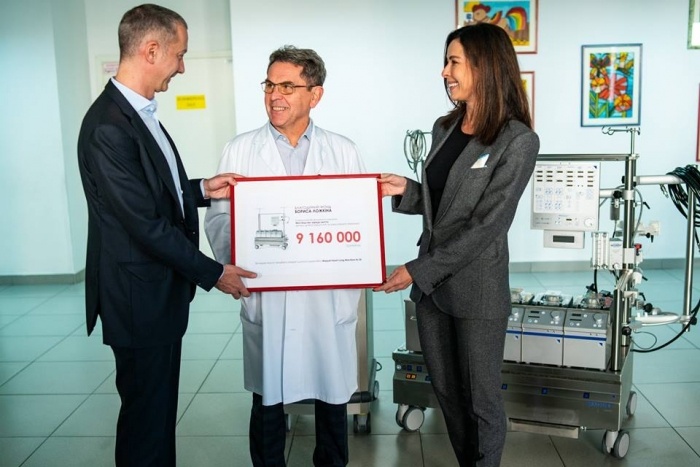 Photo: from the personal archive of Boris Lozhkin
Photo: from the personal archive of Boris Lozhkin
Source: berlin-visual.com


 +4 Kyiv
+4 Kyiv

